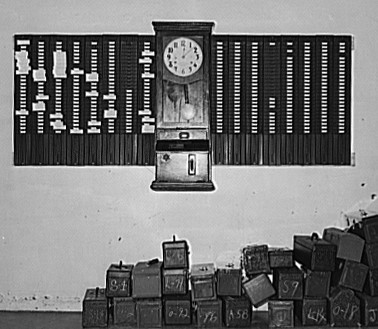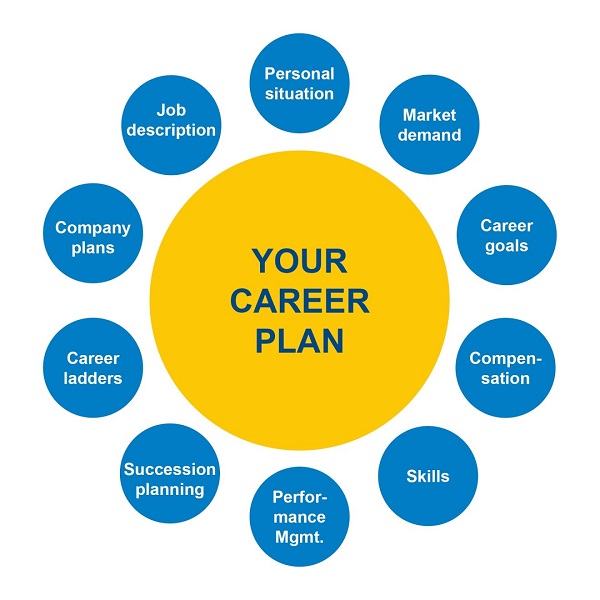The beautiful Mary Kay had it right when she said “Most people plan their vacations better than their careers.” I find this an accurate statement. On the occasions when I’ve asked a group of employees how many have a career plan it is rare to have more than one out of ten respond they do.
Everyone else spends more time planning their escapes than their career.
This business about career planning is true no matter your level at the company. Business plan, department plan, marketing plan…of course. Personal career plan…probably not.
Q: Why bother making a career plan?
A: You get what you ask for.
“A goal without a plan is just a wish.”
― Antoine de Saint-Exupéry
Here is an excellent opportunity to work on your career plan…think about the all of it…and encourage others at your company to do the same.
What goes into a good career plan? Consideration of all the wants and needs that must be addressed in the diagram.
Give yourself the time and space to venture into your amazing future. Meditate on it. Journal on it. Talk to experts about it. And get super clear about it.
The schematic above shows how interrelated your career plan is. Let’s break down each one of these subjects… none of which are “in order”.
Personal situation – Your career plan will be different if you are 20 or 60. If you are single or married. If you love your job or hate your job. I can tell you that your career aspirations can cause damage to your personal life if they are not in alignment. I litigated cases for over 70 hours a week and sat on non-profit boards at the same time. The people who paid the price for those heroics were the people who mattered most, my wife and children. Hence the divorce. And a lot of pain.
Never forget the impacts your career choices have on the people you love most in your life…including you.
Career Goals- it seems as if career planning is much easier once we are clear on our goals. You may have the goal of running a successful law firm or get that V.P. role…only to find yourself exhausted and divorced and bankrupt…just like I was. Because I didn’t think about the all of it and have a career plan in alignment with it.
To do it right you begin with the end in mind. Both short term and long term. Think of how you would like to see your career in a year or two from now. Then think about your ideal long term career aspirations. A plan may be to land a steady job at a law firm right out of school, be on a partner track in five years and eventually be a top partner at one of the top law firms in the city. Or a plan could be to be a great barista within three months, manage the place within a year and own a franchise within three years. Just make sure if you get it…it’s want you really want and not somebody else’s idea for your life.
See the document I did Visualization Techniques for Success to help with this process.
Market demand – Your value in the market place depends on numerous factors including the industry you are in, your location, availability of skilled labor, competition, economy, etc. It is always helpful to know how you can increase your value in the market place and if you can’t then what market place will be best for your career? If your goal is to be in hospitality but you intend to stay in South Dakota I guarantee you’ll have limited career opportunities.
One way to get past assumptions and find out your value in the marketplace is to pay a recruiter for an assessment of that value…even if you are not looking.
Job description – This document defines who you are… whether you like it or not. And if you don’t like it then change it. Seriously. A lot of job descriptions are out of date and non-sense. Bottom line is to create a job description in alignment with the work you are doing. PS a good place to see job descriptions, career paths and more is https://www.onetonline.org
Company plans – Is it company on a growth path? How does it expect to continue to grow the bottom line? Can you see them doing well for another five years? What have they told you about the company finances or direction? If you work at a public company this information is readily available. At a private company you owe to yourself to find out what you can.
Career ladder – Assuming there is one, does the career ladder do a good job of defining the opportunities at your company and how does it align with your career planning? If the company has no formal career ladder process then understand what the informal process is. Don’t assume anything. Ask until you are clear.
Succession planning – Excellent companies do this and the poor ones don’t. There’s a natural flow of employees through any organization and managing it is either random and chaotic, or organized and well managed. Either way, find out where you fit in the scheme.
Performance management – Our career is greatly influenced by how we are managed. Are you 100% clear about expectations, tasks, goals, etc.? Do your performance management conversations come frequently enough? Are they focused on helping you to improve performance? Are you asking for the resources and support you need to perform at your best?
Your skill sets – Nobody’s going to hire me to manage their Excel spreadsheets. I can hardly drag myself to manage my own. Therefore it would not make sense for me to engage in a career path as a CPA. It’s important for you to understand what you’re good at and what you enjoy doing best. A simple exercise: write down the five things you think you do best from a skills standpoint and then circle those two things you enjoy doing most. Those two items are your sweet spot and you should try doing it more than half the day.
Compensation structures – How does the money line up with your career plan? One way to get compensated more is to stop doing low value work. For example if you are paid $100,000 per year you are paid roughly $50 per hour. You disservice yourself every time you do $25 per hour work. Even if you’re good at it. And can do it in your sleep. And won’t mess it up. And you won’t really have the time to train or show somebody else how to do it. And on and on and on.
You can’t become more valuable more until you stop doing low value work. Figure out how to automate it, outsource it, delegate it or eliminate it all together.
So there you have it. A diagram and a checklist to consider. I’m sure I missed something on the list but this is a good place to start.
Here’s to you great career, Don





